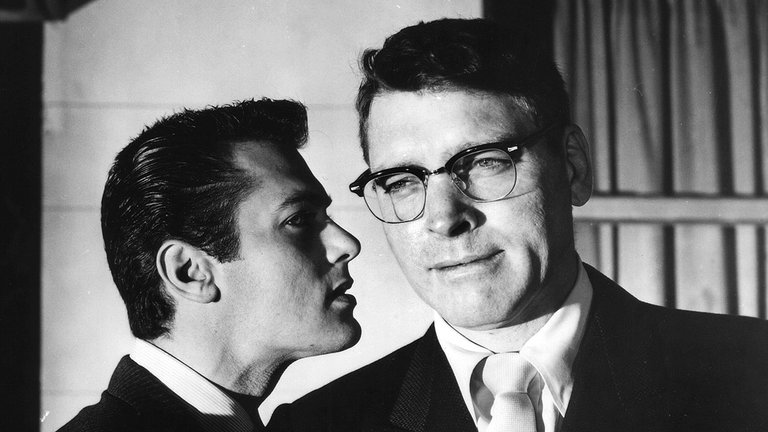Film Review: Sweet Smell of Success (1957)

Half a century ago, the Watergate Affair created the myth of journalists as noble defenders of morality in the public sphere and ethical bedrocks of America and other Western societies. In reality, however, journalists are just as morally challenged as the rest of society, with some becoming notorious for their lack of ethics and destructive influence on society. One such individual was Walter Winchell, whose life and career inspired the plot of Sweet Smell of Success, a 1957 drama directed by Alexander Mackendrick, a highly regarded Hollywood work of its time.
The film is based on Ernest Lehman's 1950 novelette Tell Me About It Tomorrow! which was partially inspired by author’s experience as a New York celebrity publicist. The story revolves around Sidney Falco, a young and ambitious but struggling press agent played by Tony Curtis. His career depends on his clients being named in the celebrity gossip column of J.J. Hunsacker, a popular and influential but ruthless newspaper journalist portrayed by Burt Lancaster. As Falco's clients begin to disappear from Hunsacker's column, it becomes clear that the columnist demands something in exchange. Falco must ensure that Hunsacker's younger sister, Susan (played by Sarah Harrison), breaks up with her romantic partner, young jazz musician Steve Dallas (played by Mark Millner), whom J.J. deems unworthy.
Sweet Smell of Success was produced by Hecht-Hill-Lancaster, a company known for pushing the boundaries of creative freedom in 1950s Hollywood. Burt Lancaster, one of its founders, held left-leaning political views and, like many of his contemporaries, considered himself a target of Winchell, who had played a significant role in the McCarthy-era persecution of American leftists. The film was an opportunity for Lancaster to turn the tables on the odious columnist, and he enthusiastically portrayed his fictional alter ego, J.J. Hunsacker. This character is well-spoken and regal but also intimidating, soulless, and ultimately dangerous, making him one of the most formidable and iconic villains in the history of 1950s American cinema.
Interestingly, Burt Lancaster does not play the main character; that honour goes to Tony Curtis, a younger actor who had recently become a star. His stardom was built largely around his good looks, which stand in stark contrast to the reprehensible actions of Sidney Falco. Curtis demonstrates great acting talent by portraying a character who is anything but star-worthy – a pathetic, morally questionable, and cowardly henchman.
Lancaster and Curtis easily outshine the rest of the cast, although capable character actors populate the supporting roles. Susan Harrison is solid in her role as the younger sister, alternating between being a victim and manipulator. Mark Millner is somewhat too straight-laced as the young man who serves as a moral anchor, and his career was subsequently built around squeaky clean characters in 1960s and 1970s television shows.
The production of Sweet Smell of Success was notoriously difficult. Famous playwright Clifford Odetts was hired to work on the script at the last minute and had to write some scenes at the very set. One of Odetts' motives for working on this anti-Winchell picture was to make amends for his own co-operation with HUAC, which many of his leftist friends saw as personal betrayal.
Alexander Mackendrick, a director best known for Ealing comedies in post-WW2 Britain, was an unusual choice to direct the project. He had often felt intimidated by Lancaster at the set, but thankfully, his eventual lack of skills for serious drama was compensated by good acting, excellent black-and-white cinematography by veteran James Wong Howe, impressive jazzy score by Elmer Bernstein, and skillful use of New York City locations.
Sweet Smell of Success can today be seen as some sort of document of its time, showing the popular fashion, jazz music still being considered some sort of "cool" anti-establishment, and showing the world very much like the one presented at the beginning of Mad Men. On the other hand, the theme of unchecked power of media manipulation heavily concentrated in a few malevolent individuals and entities seems as relevant today as it was in the 1950s.
Mackendrick's film is another good example of how the strict censorship standards of Hollywood began to loosen in the 1950s with material that was unimaginable on the big screen only a few years earlier. That included police corruption, US senators being involved in extramarital affairs, pimping, drugs, or even some hints of incest-like relationships.
Despite turning into a failure at the box office, which is often attributed to Lancaster and Curtis fans not being prepared to see their favourite actors play such despicable characters, critics were much more enthusiastic. Winchell, who had rightly recognized the film as an attack on himself, initially reveled at the fiasco. However, critics' view ultimately prevailed in the long run, even shaping future reputation of Winchell, who would soon afterwards lose much of its previous power and influence. Sweet Smell of Success earned a reputation as a classic that, quite deservedly, holds to this day.
RATING: 7/10 (+++)
Blog in Croatian https://draxblog.com
Blog in English https://draxreview.wordpress.com/
InLeo blog https://inleo.io/@drax.leo
Hiveonboard: https://hiveonboard.com?ref=drax
Rising Star game: https://www.risingstargame.com?referrer=drax
1Inch: https://1inch.exchange/#/r/0x83823d8CCB74F828148258BB4457642124b1328e
BTC donations: 1EWxiMiP6iiG9rger3NuUSd6HByaxQWafG
ETH donations: 0xB305F144323b99e6f8b1d66f5D7DE78B498C32A7
BCH donations: qpvxw0jax79lhmvlgcldkzpqanf03r9cjv8y6gtmk9
Posted Using InLeo Alpha
Congratulations @drax! You have completed the following achievement on the Hive blockchain And have been rewarded with New badge(s)
You can view your badges on your board and compare yourself to others in the Ranking
If you no longer want to receive notifications, reply to this comment with the word
STOPCheck out our last posts: